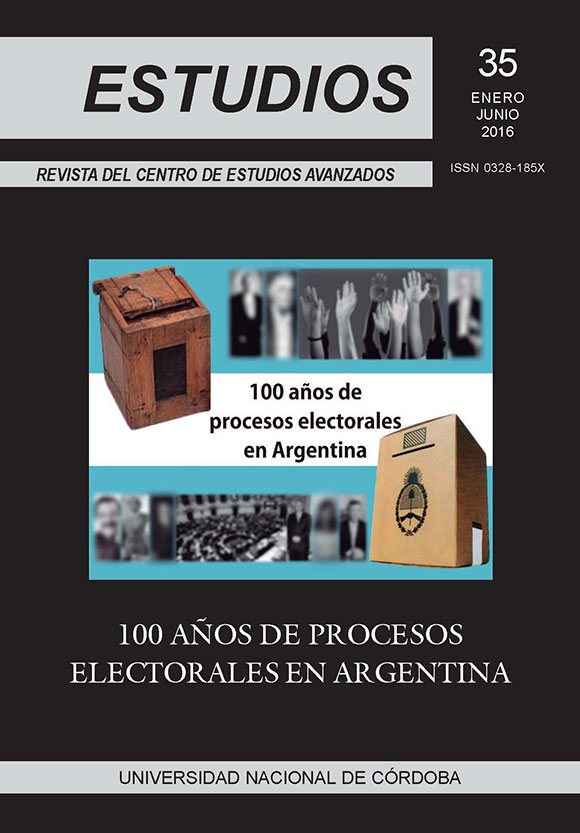Electoral reform and federal intervention: persistence of the principles of unanimity and consent, Salta 1912-1918
DOI:
https://doi.org/10.31050/re.v0i35.15661Keywords:
electoral reform, electorales rights, unanimously, consentAbstract
In this article we propose to analyse the behaviour of the electorate and the strategies of the political leaders of the province of Salta to resolve the tension produced within the oligarchic power structure, the forced extension of political rights in a society thought to be 'naturally' unequal. Simultaneously we are interested in giving an account of the implications of the rise to government of Yrigoyenist radicalism and the Federal Intervention of 1918, which make explicit the questioning of the ingrained way of 'doing' and 'thinking' electoral competition in the local social space. We wonder to what extent the old principles of unanimity and consent that accompanied the local political game will be questioned in the new scenario posed by the irruption of national politics and the expansion of electoral rights, considered as rights of individuals against a local political culture that had processed suffrage as a corporate and unanimous gesture.Downloads
References
ANSALDI, Waldo, (2000),“La trunca transición del Régimen oligárquico al Régimen democrático”. En:FALCÓN, Ricardo (Director) Nueva Historia Argentina, Democracia, conflicto social y renovación de ideas (1916-1930),Tomo VI.Buenos Aires:Sudamericana.
CANTÓN, Darío. (1964) El Parlamento Argentino en épocas de cambio: 1889, 1916 y 1946. En Revista Desarrollo Económico, Vol. IV N°13. Buenos Aires.
CARLÉS Manuel (1919) Intervención Nacional en Salta. Buenos Aires: Talleres Gráficos Argentinos.
CARO FIGUEROA, Gregorio, (1970),Historia de la gente decente del Norte Argentino. De Güemes a Patrón Costas. Buenos Aires: Mar Dulce.
CASTRO Román y SORT Josep. (2000). “Las elecciones”, en Temas clave de Ciencia Política, Colección Universitaria. Madrid:Gestión, pp 99 - 142.
COLMENARES, Luis, (1982),Mi Padre. Salta: Talleres Artes Gráficas.
CORNEJO, Atilio, (1984),Historia de Salta (1862-1930), Instituto San Felipe y Santiago de Estudios Históricos de Salta, Tomo XII, Boletín N°37.
CORREA, Rubén y TORINO, Esther, (2000),Representación y ciudadanía difusa en el Régimen político salteño en la primera mitad del siglo XIX. Primeras Jornadas Internas de la Escuela de Historia. Facultad de Humanidades. Universidad Nacional de Salta.
CORREA Rubén y QUINTANA Sergio (2012);”Ley Saenz Peña y reforma electoral provincial en clave oligárquica, Salta, 1912”. En Estudios Sociales, Revista Universitaria Semestral N° 43 Universidad Nacional del Litoral.
DE PRIVITELLIO, Luciano, (2011), “Las elecciones entre dos reformas, 1900-1955”. En en SÁBATO, Hilda, TERNAVASIO, Marcela, DE PRIVITELLIO, Luciano y Ana PERSELLO, Virginia, Historia de las Elecciones en la Argentina: 1805-2011. Buenos Aires:El Ateneo.
FRÍAS, Bernardo, (2013); Tradiciones históricas. Salta: EUCASA.
MANIN, Bernard (2015): Los principios del gobierno representativo. Madrid: Alianza.
ROSANVALLON, Pierre, (2009),La legitimidad democrática. Buenos Aires: Manantial.
YRIGOYEN Hipólito (1956) Pueblo y Gobierno. La Reparación Institucional. La República Federal.Tomo V. Buenos Aires: Raigal.
URIBURU MICHEL, Francisco, (1993),Dr. Francisco M. Uriburu. Su tiempo y su circunstancias, 1881-1927. Salta: Talleres Gráfiker.
Downloads
Published
How to Cite
Issue
Section
License
Aquellos autores/as que publiquen en esta revista, aceptan los términos siguientes:- Los autores/as conservarán sus derechos de autor y garantizarán a la revista el derecho de primera publicación de su obra, el cual estará simultáneamente sujeto a la Licencia Creative Commons Atribución-NoComercial 4.0 Internacional que permite a terceros compartir la obra siempre que se indique su autor y su primera publicación esta revista.
- Los autores/as podrán adoptar otros acuerdos de licencia no exclusiva de distribución de la versión de la obra publicada (p. ej.: depositarla en un archivo telemático institucional o publicarla en un volumen monográfico) siempre que se indique la publicación inicial en esta revista.
- Se permite y recomienda a los autores/as difundir su obra a través de Internet (p. ej.: en archivos telemáticos institucionales o en su página web) luego del proceso de envío, lo cual puede producir intercambios interesantes y aumentar las citas de la obra publicada. (Véase El efecto del acceso abierto).











